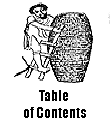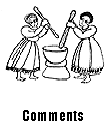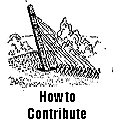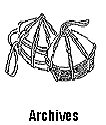
 by Felleke Mind you, we really weren't naughty boys. But while Baba was chatting with a neighbor across the newly installed chain-link fence, or while Ima was in the rickety DKW, attempting to start the engine in vain, neither of them was much inclined to satisfy our curiosity. No, they wouldn't bother to tell us why menacing clouds clear the sun when you rubbed a dandelion stem between your palms, nor did they care to explain why Teté, our paternal aunt, was only able to have one baby while Mikiti, our sly mongrel, had eight puppies. Without turning their heads to look down in our direction they would snort at our impertinence and invoke His name. Terrorized, my older brother and I would immediately cup our ears and tiptoe out of their sight. The first time we saw Him we had mistaken him for the Chinese trapeze artist we had seen swing from the catwalks at Haile Selassie I Theatre several weeks earlier during a Saturday matinee. But once we had crossed what was then a single-lane Bole Road, dragging on the arms of Ityé, our reluctant nurse, it became evident that the figure treading on the charred rafters of the brick mansion in ruins was clearly not the nimble gymnast from Shanghai. I tightened my grip on Ityé's chapped hand as we cautiously trudged through tall mustard weeds in full bloom and a dense cluster of bamboo shoots that encircled the abandoned two-story villa. My older brother, whose head towered above the profuse wildflowers, was able to see Him with very little obstruction. On the other hand, I had to shield my eyes from thorny twigs and draw the bamboo to the side in order to get a tolerable view. Impressed with the cleanliness of our surroundings, my brother asked Ityé why nearby residents had not used the unenclosed estate for dumping their garbage. Ityé explained that the children of the late Ras who had built the mansion lived in the area and kept vigil. We inched closer to the steps leading to the nine-foot high empty front door frame. A few sooty bricks, hitherto joined for life, tumbled from the second floor and shattered on the steps. My older brother leaped and dodged behind Ityé to avoid being struck by a broken pieces. I peered through the doorway and past numerous dead insects and twigs trapped in and between several layers of spider webs. Mid afternoon sun shone past the beams of the roofless building, casting His shadow on the waterlogged wooden floor of what must have been the grand reception. Curious extensions from his head swung from side to side as we heard him shout Carabinieri! Carabinieri! Carabinieriiiiiiiii! Ityé squeezed my tiny fingers and began to make the sign of the cross with her right hand as she whispered His name. My older brother, who had refused to holding adult hands after his fifth birthday a week ago, grabbed Ityé's before her fingers completed outlining the design of the imaginary crucifix. She whisked my brother and I away from the ruins and nearly got us hit by a deluxe gray sedan crossing Bole Road. She held our hands and continued to dash across a field filled with dandelion sprouts. I locked my arms around her neck and my ankles around her waist, planting my chin against her unsteady shoulder. Wrapping his bare arms around the tottering chimney, He stared blankly in our direction. Abundant gray and white dreads covered and adorned his taut torso. Once we entered our compound and Ityé had bolted the gate, I asked why the Ras' children allowed Him to haunt their father's house. Ityé bent forward and lowered me to the ground. Forcing my stubborn fingers open, she removed my arm from around her neck. She straightened up and brushed off some yellow pollen off her pleated skirt. My older brother repeated my question as he removed his sweater and wiped the sweat off his face with it. Irritated, Ityé scowled and ordered us to play on the lawn with Mikiti and her puppies. She had had it with our never-ending questions. ******** For many nights to come, I refused to sleep with the lights off. Ityé had to sit on the Egyptian hassock right next to my bed, with the lights on, and wait until exhaustion forced my eyelids to close and brought my vigorous imagination to a standstill. In the meantime, she would narrate stories or describe peculiar sensations from her childhood. She talked about the open air roast under the stars during the sorghum harvest, surrounded by her parents and seven brothers, or about the titillating vibrations on her back during a hailstorm in the middle of an upland meadow, enclosed and sheltered under her straw mat. I would visualize the hail pellets forming an embankment behind young Ityé's makeshift refuge as my half-opened eyes wondered and examined the gold leaf illustrations of ancient Egyptian icons on her checkered black and red leather seat. Ityé would conclude with the familiar but wrenching story of her flight from her family home while my eyes transfixed themselves on the headdress of Tutankhamen. All of a sudden, the horizontal designs on the Pharaoh's shoulder- length diadem would shatter and transform themselves into serpentine dreads, meandering towards me. I would yell out His name in horror and grab my ears, tightening the sheet around my face. My older brother, whose outline I could discern under the Debre-Berhan plaid blanket, always pretended to be asleep; nevertheless, he never failed to cover his ears when His name was uttered. From that night onwards, Ityé remembered to cover the hassock with her shawl before she sat down. ******** And yet, in spite of our dread, all the grown ups except for Ityé continued to threaten us by invoking His name or describing His penchant for snipping off the ears of disobedient boys. When my older brother and I exceeded our daily quota for queries; when we played hide and seek in the study while Ima was listening to the news on the old short wave; when we walked into the house with our muddy boots while Emama Lemlem was waxing the floor; when we lurked around the dining table while Baba and his friends where in the middle of a card game, they would all warn us about losing our ears to His gigantic scissors. ******** Every weekday morning on our way to school, my older brother and I never failed to peek at the ruins from the backseat of the doddering DKW. Immediately after Ima managed to start the car and the guard opened the gates, my baby brother would run out of the house, hover by the driver's door and insist on going to his school. Ima, who never left the house on time, would refuse until our youngest sibling would burst into tears and wail in front of the car. Mumbling her outbursts, Ima would ransack her handbag looking for that ever-elusive tissue paper to wipe her sunglasses. Ityé would miraculously appear and hand Ima some tissue paper through the open window. Our mother would then wipe the fingerprints of one or two of her sons off her sunglasses as Ityé picked up the crybaby and hopped in the back seat. Although his cheeks were drenched with tears our baby brother would break into a triumphant beam, seated on Ityé's lap. As soon as we reached Bole Road, Ima would stop the car and we would all chime "Mamush's School." Mamush would grin and wipe the snot and the dried tears off his face with his forearm. Ima would then extend her arm over her shoulder and wave at Ityé with a couple of tissue papers between her fingers. Ever fearful of her neurotic DKW, Ima would periodically pump the gasoline pedal with her pointed Italian heels and wait until Mamush's nose was properly wiped before they got out of the car. Our surreptitious glances across the street seemed to be for naught. We looked on our way back from school, on our way to visit our parents' friends or extended family members during the weekend, and on our way with Baba during our Sunday morning walks on Bole Road. He was nowhere to be seen. ******** "Wake up and put your coat on," Ityé urged, "or else we will miss the Emperors' cavalcade." School had been closed that Monday in honor of the Shah of Iran's state visit to Ethiopia. I awoke from my afternoon nap and looked around the bedroom. My older brother was already in his heavy coat. I sat up and glanced through the doorway and into our parents' bedroom. Mamush was still napping in his crib. My older brother and I were relieved. Neither of us wanted to be bothered with the baby. We stepped out of the house and waited for Ityé and Emama Lemlem to wrap up their conversation. Mikiti lay on the front porch curled next to a few red geranium pots. Anxious not to miss the procession, my older brother ran down the steps and waited by the gate. Ityé asked Emama Lemlem to keep an eye on Mamush and lock the front door from the inside. Although we were five days shy from the customary first day of the rainy season, thunderclouds had enveloped the entire city, diffusing the rays of the early afternoon sun. Suddenly, a gust of wind blew all the petals off the geranium plants and scattered them all over Mikiti. Unimpressed and irritated by nature's improvised festoonery, the mongrel woke up from her slumber and shook the red flowers off her blotched body. I shivered and rubbed my shoulders as Mikiti brushed past me and ran to the back of the house. Ityé squatted and buttoned my coat. My older brother, who had slipped out of the compound, told us that soldiers were already standing guard on Bole Road. Ityé, instead of walking on the gravel road, decided to take the short cut and ran across the pasture with us. The white feathered, cottony seeds of mature dandelions covered the entire field. I wanted to stop and cut off a few stems but did not for fear of missing the Emperor and the Shah. A meter apart from one another, musketeers formed a line on both sides of the road that stretched from the airport to Jubilee Palace. Hundreds of people were already congregated behind the troops. While Ityé was looking for an opening in the assemblage, numerous women began to ululate in the distance. Ityé lifted me off the ground and implored a fellow spectator to do the same for my older brother. I heard a Sergeant bark a command as the soldiers raised their guns and held them diagonally across their chests. A cavalry unit of Imperial Guardsmen in splendid uniforms trotted in formation toward us. Synchronized hoofbeats on the newly paved asphalt began to regulate the tempo of the ululations. I looked up in the direction of His dwelling. Burdened with the full weight of their age, the cluster of curved bamboo stalks swayed against the breeze, obscuring the front entrance. Older bystanders fell to the ground to genuflect as the younger crowd leaned forward to look back at a team of six white horses drawing the black barouche toward them. It was then that the wind began to blow in full force. Elderly women lying on the ground tightened their shawls around their bodies; young men raised their jacket collars; the bamboo stalks creaked, disrupting the harmony between hoofbeat and ululation. All of a sudden, thousands of airborne dandelion flowers descended on the street. I blew at several tufts to clear my view. The two Emperors, seated face to face, smiled and waved mechanically. Then I heard His unmistakable voice thunder, "O God, that I may be at once avenged!" I turned toward the ruined mansion as He charged with a musket down the shrouded front steps. I wrapped my arms around Ityé and yelled, "Baba Goom-Goom is coming! Baba Goom-Goom is coming!" His dreads rose and fell against his shoulder as he bellowed "Die, Carabinieri, die!" and ran past several spectators. The Sergeant yelled as a dozen soldiers from across the street cocked their rifles and turned toward Baba Goom-Goom. Our Emperor's frail hand froze in midair. The perplexed Shah followed Janhoy's gaze. Staring straight into the eyes of the Iranian monarch, Baba Goom-Goom shrieked, "Your time is up, Carabinieri, die! The soldiers pointed their rifles at Baba Goom-Goom, waiting for the Sergeant's ultimate order. Then, a tall, middle-aged lady with upright posture appeared and stood between Baba Goom-Goom and the executioners. The soldiers hesitated and glanced toward their superior for guidance. The Lady frowned at the Sergeant and turned toward Baba Goom-Goom. She whispered and shook her forefinger from side to side. Baba Goom-Goom slumped and looked in the direction of the street. The Lady tugged and removed the rifle from His clutches, handing it to her attendant. She wrapped a blanket around His bare shoulders and led Him out of our sight. ****** The sun broke through the clouds. The dandelion spikes sparkled as they lazily rolled on the empty street. A military truck stopped nearby as several soldiers climbed on the back. Several curious spectators surrounded a bemedaled graybeard and began to interrogate him. Ityé thanked the person who had carried my older brother and walked toward the gathering. My arms were still tight around her neck. "Poor Samson," I heard the old man say. The five medals pinned on his coat pocket shook as he raised his arm and pressed the corner of his eyes with his fingers. "He mistook the Shah for the Italian soldier who executed his son the day they burned the Ras' house." That night I slept with the lights turned off ****** Years later, I went to Peacock Bar with several teenage friends. We ordered espressos and cafés au lait in the car and drifted into an animated discussion about the best way to escape from the country. While a friend in the driver's seat expounded on the advantages of the Kenyan over the Djiboutian route, my mind began to wander. I looked through the back passenger window and glanced past the bar, past Nalbandian Pharmacy and past Addis Abeba Bank. A dandelion flower bounced against my window and shook me out of my reverie. It tumbled on the parking lot and into the pharmacy entrance. Excusing myself, I stepped out of the car to search for the remnants of the Ras' ruins. I walked around the bank and noticed a few villas enclosed in granite walls. Numerous piles of trash and debris were piled high against their fences. Soon, I realized that the Peacock Bar complex and the villas had been built over the site of the two-story brick mansion. Baba Samson's echoes were nowhere to be heard. |

|

|

|

|

|
| © Copyright SELEDA Ethiopia, April 2001. All Rights Reserved. |